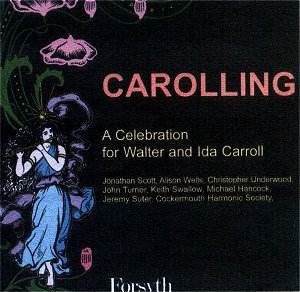Few of us who were
brought up on early piano lessons with
parochial music mistresses will fail
to recall those piano albums, covers
decorated with Rackham Fairies, and
with poetic titles of music by Walter
Carroll. Carroll’s is a name to many
but is regrettably little known as a
composer of larger scale music or furth
of Manchester. This disc is by way of
a tribute to this interesting composer
and to his daughter Ida, Principal of
the Royal Northern School of Music,
for their work in the field of musical
education. This uniquely combined the
"sister arts" of painting and poetry
for the young pianist. As so often happens
musicians like Carroll were prevented,
by their deep involvement in the educational
side of music making, from having the
time and energy to devote to any kind
of large-scale composition. Nonetheless
such compositions as they did manage
to produce ought to be looked at with
interest. Another such was the composer
Dorothy Pilling of the staff of the
Northern School who is also represented
on this disc. Here both she and Carroll
are well served by the instrumentalists
and vocalists in a brilliantly crisp
and clear recorded sound - almost as
if one were in the very room leaning
over the piano. The major work (sic)
is the C minor Piano Sonata of Walter
Carroll, written in 1892, superbly played
by the young Jonathan Scott - a pianist
of exceptional poetic understanding
as well as technique. My respect for
his playing increases every time I hear
him. The Sonata itself, very much of
its period, is in four movements, conventional
enough, though bearing a slight influence
from Sterndale Bennett, and, as the
music develops, of Schubert especially
in the Menuetto third movement. It is
a big work lasting some 15 minutes.
The decisive opening - used later in
his orchestral Festive Overture, has
decided hints of Schumann (in the 2nd
subject) - a Beethovenian Adagio, the
Menuetto, and a brisk and energetic
final Allegro - all of which one might
expect. Yet the Sonata has an appeal
of its own that makes one wish the composer
had been able to write more in this
vein.
My first encounter
with Dorothy Pilling's music was, mundanely,
a book of short Sight Reading tests.
I was much impressed with the amount
of poetic colour she managed to infuse
into this work-a-day medium. She is
represented here by three short piano
"Vignettes" which are as imaginative
as anything from that so fertile period
in English piano writing between the
wars, holding their own with early Frank
Bridge. (The final Promenade has decided
echoes of Ibert!) In between those items
are songs, also by Dorothy Pilling -
all charming (in the best sense of that
much misused word) and full of that
sense of the poetic that both were constantly
in search of. The song "Jenny Kiss'd
Me" (Leigh Hunt) is a perfect gem, and
the addition of recorder obbligato makes
for some delightful moments. The second
set, for baritone, is more advanced,
including her setting of "The Splendour
Falls" which perhaps rather fades in
the light of Britten's setting. The
disc ends with fine, if unadventurous
settings of the Magnificat and Nunc
Dimittis and a final swinging Jubilate.
The disc illuminates a frequently overlooked
corner of this field.
Colin Scott-Sutherland
